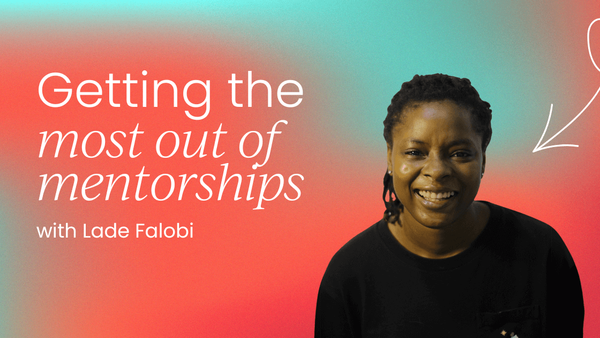Mentorship is often hailed as the ultimate career accelerator, but it's not always about formalized programs or big-name mentors.
In my experience, mentorship can be fluid, often found in the relationships we build at work or in the informal guidance we receive from peers and colleagues.
But getting the most out of mentorship also requires some level of intention and structure. It’s not just about soaking in information; it’s about applying lessons, asking the right questions, and creating a symbiotic relationship where both sides grow.
As someone who has been on both sides of the mentorship table, I’ve learned valuable lessons that have helped me grow, both as a mentee and a mentor. Here’s what I’ve learned from both sides.
Lessons for mentees
Mentorship doesn’t have to be formal
Early in my career, I wasn't keen on the idea of official mentorships where you’d ask someone, “Hey, will you mentor me?”
Instead, I found myself learning from my colleagues, team leads, and managers naturally – without any labels. Looking back, that was mentorship in its purest form.
One of the biggest misconceptions about mentorship is that it has to be formalized – a designated mentor with scheduled sessions. Mentorship can happen organically.
In my very first job, I worked as a newspaper intern, and my Photo Editor became an unofficial mentor, teaching me the ropes of photojournalism and even giving me equipment to help improve my skills.
This was mentorship, even though we never formalized it. At another job, the CEO pushed me to improve by reviewing my work regularly and offering templates to help me organize my thoughts.
These were all informal experiences, but they shaped my skills just as much as any formal program would have, if not better.
Takeaway: Don’t wait for someone to offer you mentorship or feel like you need a formal title for the relationship. Look for learning opportunities in everyday interactions, especially from senior colleagues who can help guide you.
Find a reference point for the mentorship
A successful mentorship hinges on the ability to guide your mentor towards areas where you need help. Without it, your conversations may lack direction and fail to provide practical insights.
You can’t just go to a mentor with an open-ended request like “teach me everything.” Your reference point could be a goal, niche, topic, or even a document.
For example, when I worked at Motherboard, I received informal mentorship from the CEO specifically on product strategy. That was our reference point. Every week for three months, we spent one to two hours discussing SaaS and marketplace product strategy, which I then used to build Motherboard’s product strategy document.
Takeaway: Establish a clear goal or focus area for your mentorship. Whether it’s a project, skill set, or topic, having a reference point ensures you stay on track.
Be prepared to drive the sessions
A common mistake mentees make is assuming the mentor will take charge of the process. While mentors are there to provide guidance, it’s up to you to steer the direction of the relationship.
In my current role at EarlyNode, we hired a UX expert to mentor the product team. Each week, I would come to the session with a topic in mind and questions prepared by the team.
This not only ensured that we stayed on track but also allowed us to extract the specific knowledge we needed. If you rely solely on your mentor to steer the ship, you might end up focusing on areas that don't fully address your needs.
Takeaway: As a mentee, it's on you to guide the process. Know what you want to learn, and come prepared with questions or specific areas you need help with.
Document everything
It’s easy to rely on your memory during mentorship sessions, but the sheer amount of insights, feedback, and ideas can quickly become overwhelming. Without proper documentation, you risk forgetting important lessons or misinterpreting the advice you receive.
If you can, record every session you have. Jot down key insights and takeaways. This will allow you to look back on the conversations, refresh your memory whenever you need it, and articulate what you’ve learned. You can even go a step further and turn your learnings into a playbook.
Takeaway: Don’t rely on memory alone. Document everything to ensure that you’re absorbing and applying your mentor’s lessons effectively. This will also serve as a valuable resource for your future growth.
Apply what you learn immediately
Mentorship without action is just a conversation. The faster you put new knowledge into practice, the more it sticks.
During the UX mentorship at EarlyNode, after each session, I’d create a to-do list of practical actions we’d take based on what we learned. Not only did it help reinforce the learning, but it also provided an opportunity to get feedback from the mentor on how well we applied the knowledge.
Takeaway: Use mentorship as a springboard to take action. Don’t let the mentorship remain theoretical.
Avoid turning mentorship into a feedback loop
This might sound counterintuitive, but it isn’t. It’s easy to fall into the trap of using your mentor just to get feedback on your work, but mentorship should be more than that. It’s fine to do this 1 or 2 times, but it shouldn’t be the focus of mentorship.
If you only get feedback on a specific document or task, you might not develop the overarching skills you need. That’s why it’s best to focus on building a foundation that can apply to any scenario. Mentorship should provide repeatable knowledge – skills, insights, and strategies that can be applied across various projects.
Then, when you do seek feedback, it’s more about fine-tuning than learning from scratch. Feedback will become a way of checking that you understood and internalized the lessons.
Takeaway: Don’t use mentorship just for project-specific feedback. Focus on learning broader, repeatable concepts that can be applied across different projects.
Do your own research
Another lesson I learned during my mentorship experiences is that you can’t rely solely on your mentor for information. When I was working on the product strategy with Motherboard’s CEO, he would introduce concepts I was unfamiliar with or point out gaps in my thinking.
Instead of just taking notes and moving on, I’d spend hours researching those concepts after our calls. I’d read articles, watch videos, and immerse myself in learning more.
This additional research not only helped me understand the concepts better but also allowed me to bring fresh perspectives to our next conversation. Sometimes, I’d even challenge or expand on what he had said, turning the mentorship into more of a dialogue than a one-way street.
Takeaway: Mentorship should inspire further learning, not replace it. Use the insights from your mentor as a springboard for your own independent research.
Whether you’re looking to learn from others, guide fellow product marketers, or both, our mentorship program has something for everyone.
Lessons for mentors
As I’ve grown in my career, I’ve had the opportunity to mentor others through formal product marketing mentorship programs. Mentoring is a rewarding experience, but it comes with its own set of challenges and lessons. Here’s what has helped me.
Understand where your mentee is starting from
One of the first steps in any mentorship relationship is understanding your mentee’s current skill level, challenges, and goals. Start by asking detailed questions about your mentee.
What do they already know? What are they struggling with? What topics are they interested in learning more about? This foundation will help you tailor your guidance to their specific needs.
Takeaway: Take the time to understand where your mentee is coming from. This will allow you to customize your approach and provide actionable advice.
Customize the learning path
There’s no one-size-fits-all approach to mentorship. Each mentee has unique goals and challenges, so it’s important to tailor the learning experience accordingly.
Once you understand where your mentee is coming from, you can create a learning path tailored to their needs. Make sure to also prepare relevant resources to aid them. This makes your sessions more impactful and helps them build the skills they specifically need.
Takeaway: Tailor your mentorship approach to fit the mentee’s goals. This personalized attention can make all the difference.
Keep it interactive – encourage questions
Mentorships aren’t seminars, so you shouldn’t be the only one speaking. Allow space for your mentees to ask questions, or prompt them to answer some of yours.
You should also be flexible enough to divulge from your learning path to provide insights they specifically request.
Takeaway: Let your mentee drive part of the session with their questions. Flexibility ensures you address their immediate needs.
Encourage practical application
Theory is great, but practice is better.
I always encourage my mentees to apply what they’ve learned by giving them practical tasks to complete. This hands-on approach ensures that they not only understand the concepts but can also use them effectively in real-world situations.
It’s not enough that they understand the material; they must know how to apply it.
Takeaway: Always provide practical tasks or challenges to ensure the mentee can apply the lessons.
Don’t pretend to know everything
Finally, as a mentor, it’s important to admit when you don’t know something. Mentorship is a two-way street, and there’s no shame in acknowledging gaps in your own knowledge.
In a past mentorship, rather than pretending I had all the answers, I connected my mentee with a subject matter expert. If you can’t help your mentee in a certain area, help them find someone (or something) who can.
The most important thing isn’t that their questions are answered by you; it’s that they get the answers they need (whether from you or someone else).
Takeaway: It’s okay not to know everything. Honesty fosters trust and encourages deeper learning from both sides.
Final thoughts
Mentorship, at its best, is a collaborative learning journey. Whether formal or informal, it can create a space for shared growth, reflection, and practical application. The best mentors guide, but they also listen, challenge, and learn from their mentees.
And the best mentees take ownership of their learning, applying new knowledge and digging deeper into the areas that matter most to them. Ultimately, mentorship isn’t just about receiving or giving advice; it’s about creating a cycle of continuous learning, growth, and mutual benefit.
Join the PMA mentorship program
Become a mentor
📈 Help other product marketers reach their potential
😇 Give back to the community and leave your own legacy
🤔 Gain fresh perspectives and learn from your protégé
🤝 Level up your career and forge new, lasting relationships
Become a mentee
👩🏽💻 Tap into invaluable expertise and advance your career
👌🏻 Pick a mentor perfectly suited to your circumstances
✅ Complete, confidential 1:1 time to ask what you want
⬆️ Grow your network and learn from topic-specific specialists
💯 Solve problems and up-skill with 100% confidence


















 Follow us on LinkedIn
Follow us on LinkedIn



.svg?v=85af970283)